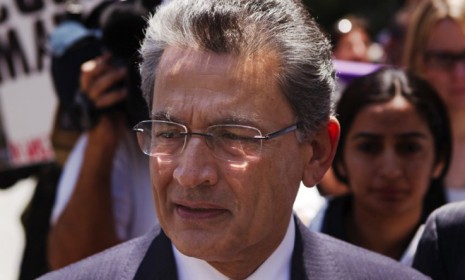Rajat Gupta's insider trading conviction: Will it curb Wall Street crime?
Gupta's fall from the top echelons of finance could reverberate throughout the industry, which is already coming under increased scrutiny from the feds

A free daily email with the biggest news stories of the day – and the best features from TheWeek.com
You are now subscribed
Your newsletter sign-up was successful
On Friday, a jury in New York found Rajat Gupta, a former board member at Goldman Sachs and Proctor & Gamble, guilty of insider trading. It was a stunning fall from grace for Gupta, 63, who overcame orphanhood in Kolkata, India, to become the head of the prestigious consulting firm McKinsey. His conviction was also the culmination of a years-long crackdown on a vast insider-trading network orchestrated by billionaire hedge fund manager Raj Rajaratnam, who was sentenced in 2011 to 11 years in prison. Prosecutors have made use of a new arsenal of investigatory tools — most notably wiretapping, which was cleared in 2010 as a tool to collect evidence for insider-trading cases — to net 60 Wall Street traders and executives in Rajaratnam's ring who have either pleaded guilty or been convicted. Will Gupta's insider trading conviction further curb bad behavior on Wall Street?
Yes. Wiretapping is a game-changer: After Gupta's conviction, "no one who's passing along insider information can be confident it won't someday end up on a wiretap played before a jury," says Alison Frankel at Reuters. In the past, insider-trading stings would have nabbed just a few culprits, but wiretapping enables prosecutors to haul in dozens of recorded accomplices. The case also set a lower standard for an insider trading conviction, since Gupta didn't benefit personally from the confidential information he passed on to Rajaratnam. "Wall Street should be worried."
"After Gupta, Wall Street watch out"
The Week
Escape your echo chamber. Get the facts behind the news, plus analysis from multiple perspectives.

Sign up for The Week's Free Newsletters
From our morning news briefing to a weekly Good News Newsletter, get the best of The Week delivered directly to your inbox.
From our morning news briefing to a weekly Good News Newsletter, get the best of The Week delivered directly to your inbox.
And juries are less tolerant of white-collar crime: "Rajat Gupta is a nice guy," says Jim Jelter at MarketWatch. At least, that's the sentiment the defense hammered home to the jury, citing Gupta's "generous charitable contributions and ardent fundraising to help the world's needy." But in the bitter aftermath of the 2008 financial crisis, the jury understood that Gupta had committed an "abuse of trust" and an "abuse of power." His conviction won't "restore the millions of dollars pocketed by Wall Street crooks," but "watching them marched off to the Big House one by one takes some of the sting out of investment losses suffered in so many of the nation's little houses these past few years."
"Convictions pile up on Wall Street"
No. It's too costly to track down and catch insider traders: Gupta's conviction "should give every would-be tip giver or user pause," but it won't necessarily "stop them from taking the risk," says Reynolds Holding at Reuters. The case against Gupta and Rajaratnam "took years of costly preparation," and the feds don't "have the resources to bring more than a few prosecutions like it." Prosecutors have sent a stern warning to Wall Street, but such a conviction is still so relatively rare that it's unlikely to dissuade wrongdoers. "It will take far more work... to reduce the menace of insider trading."
"Rajat Gupta goes down but insider trading may not"
A free daily email with the biggest news stories of the day – and the best features from TheWeek.com
-
 Local elections 2026: where are they and who is expected to win?
Local elections 2026: where are they and who is expected to win?The Explainer Labour is braced for heavy losses and U-turn on postponing some council elections hasn’t helped the party’s prospects
-
 6 of the world’s most accessible destinations
6 of the world’s most accessible destinationsThe Week Recommends Experience all of Berlin, Singapore and Sydney
-
 How the FCC’s ‘equal time’ rule works
How the FCC’s ‘equal time’ rule worksIn the Spotlight The law is at the heart of the Colbert-CBS conflict